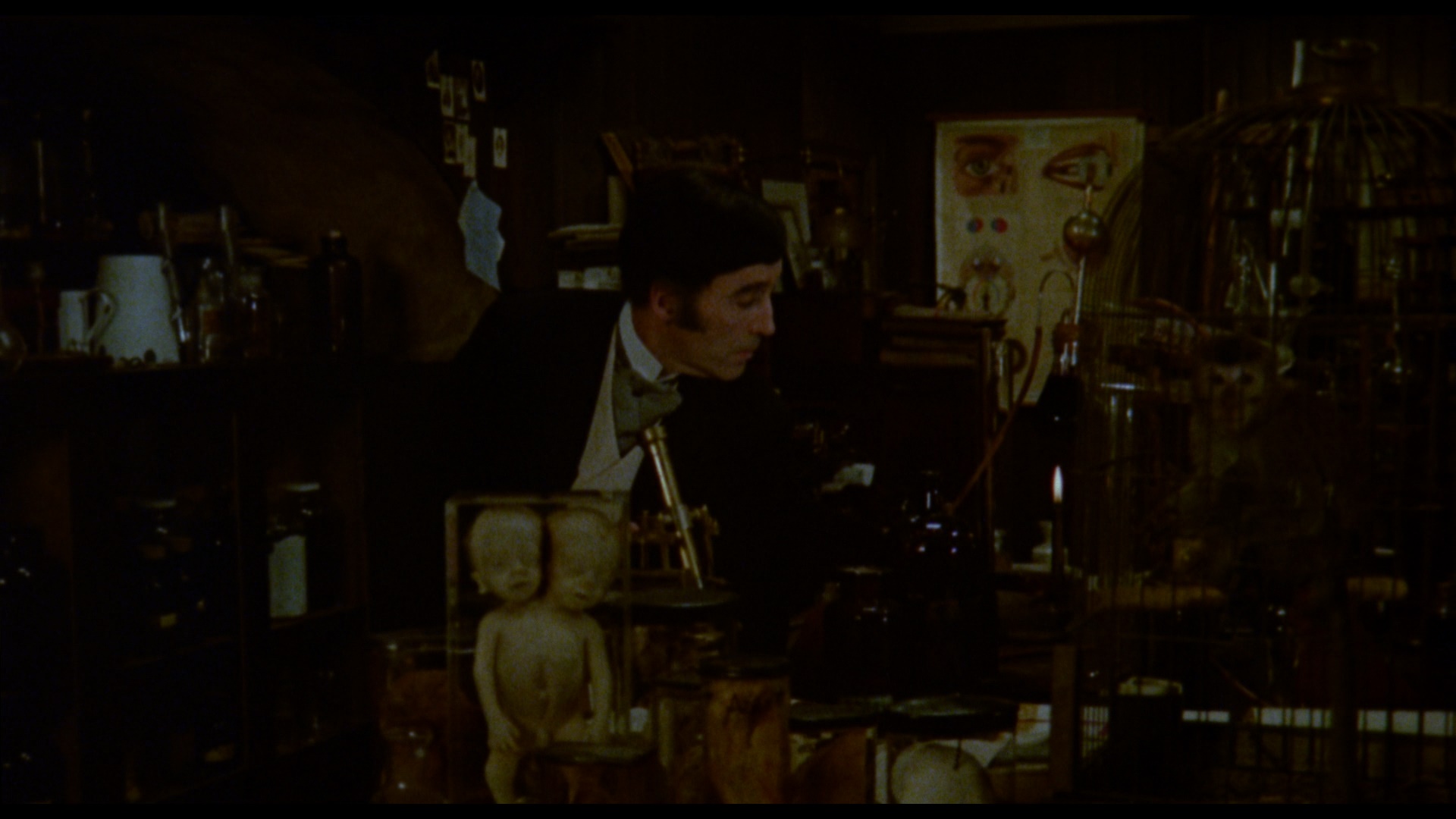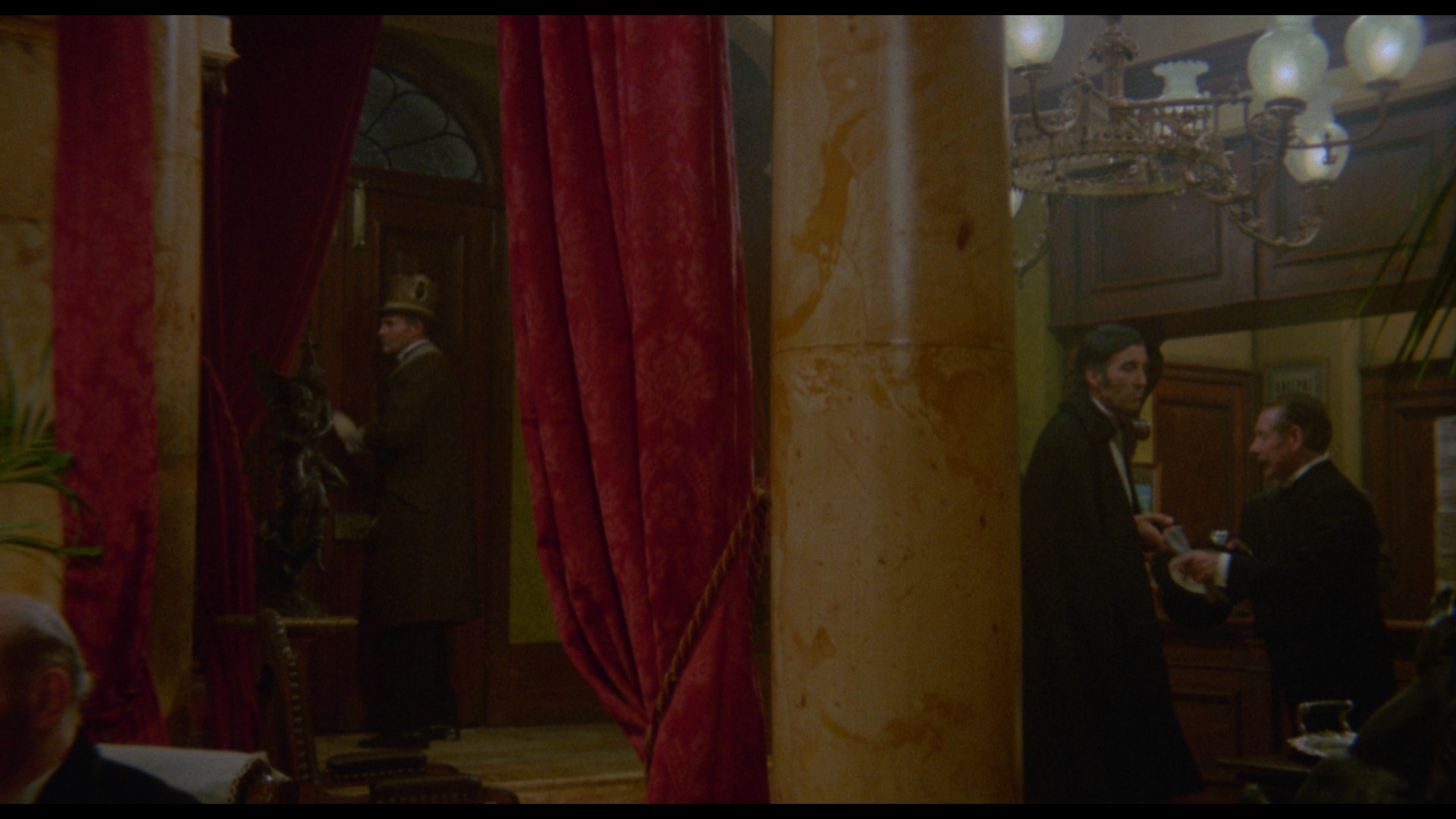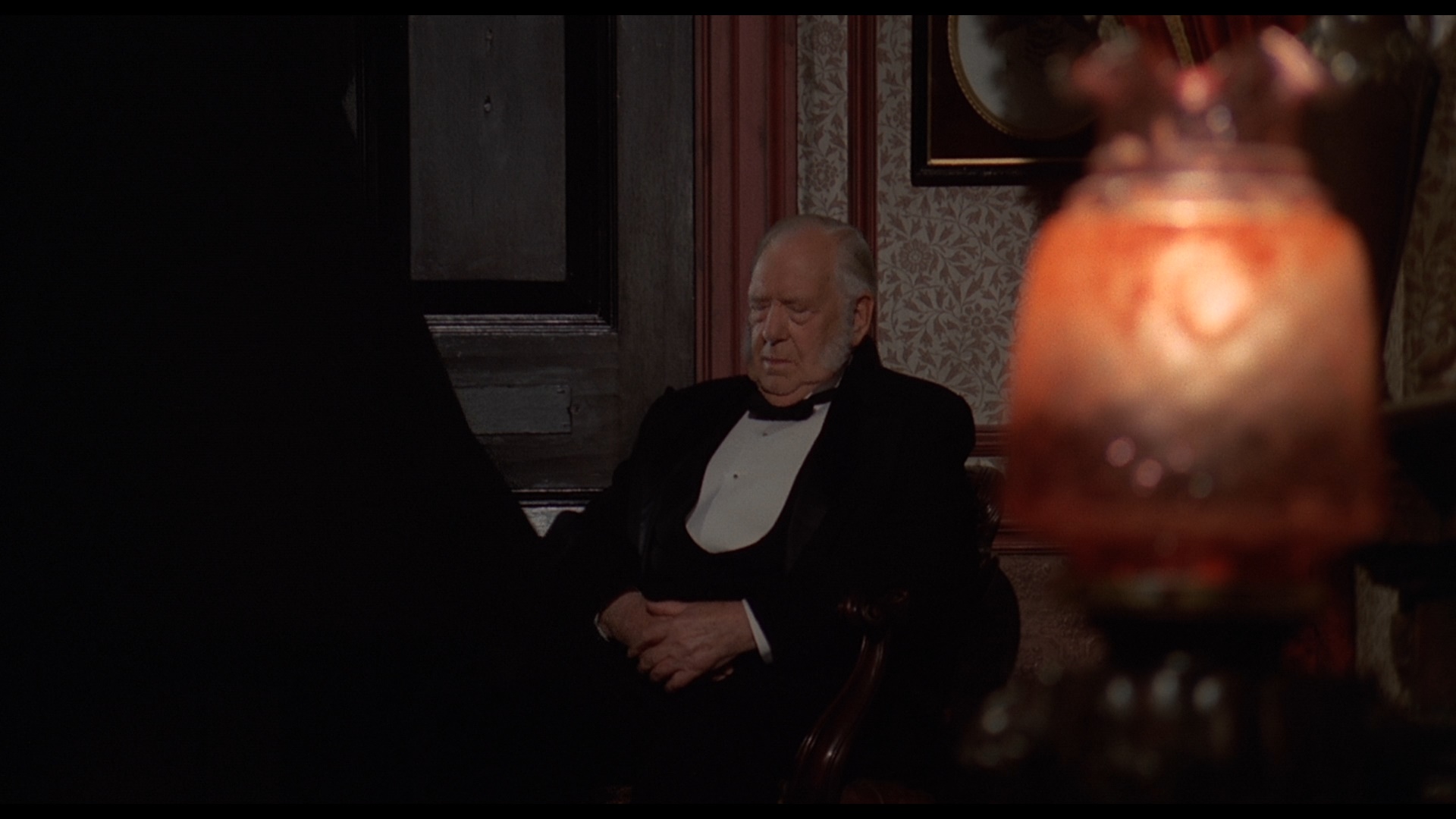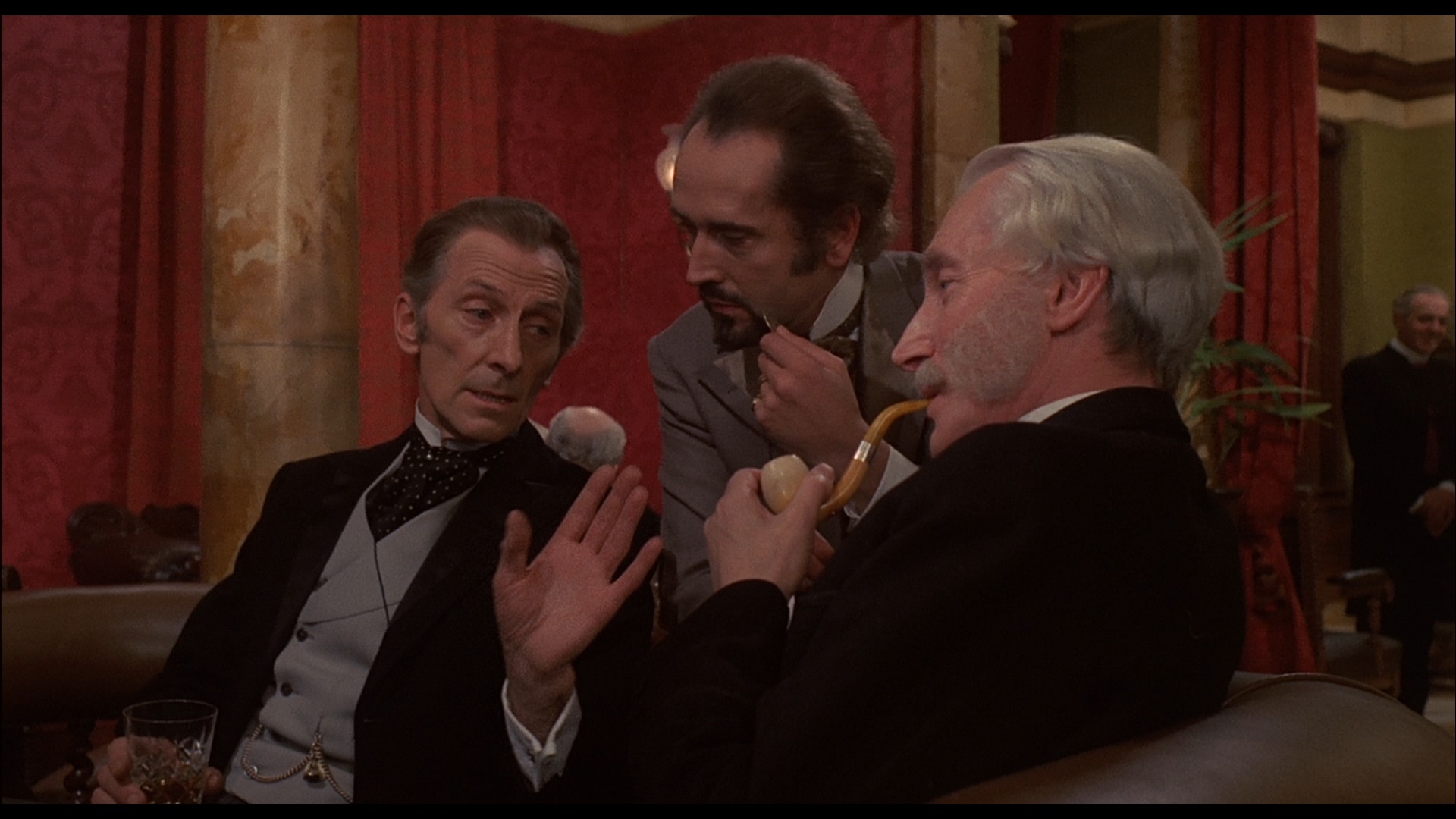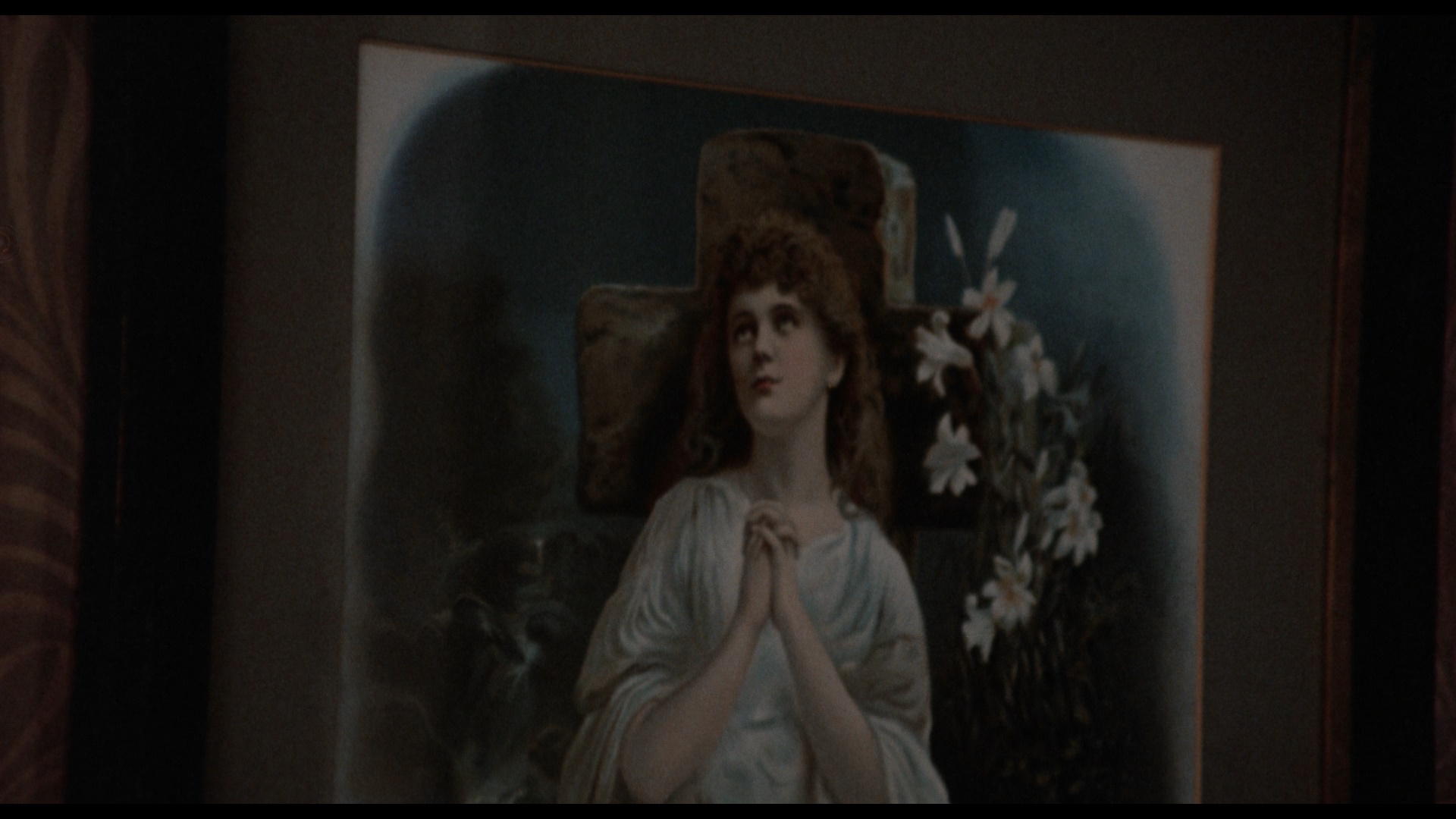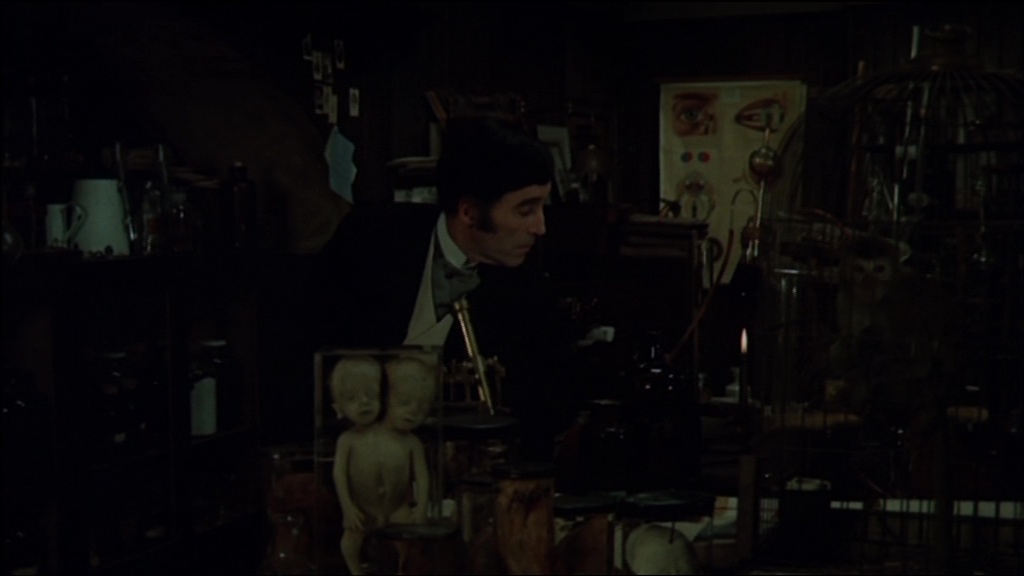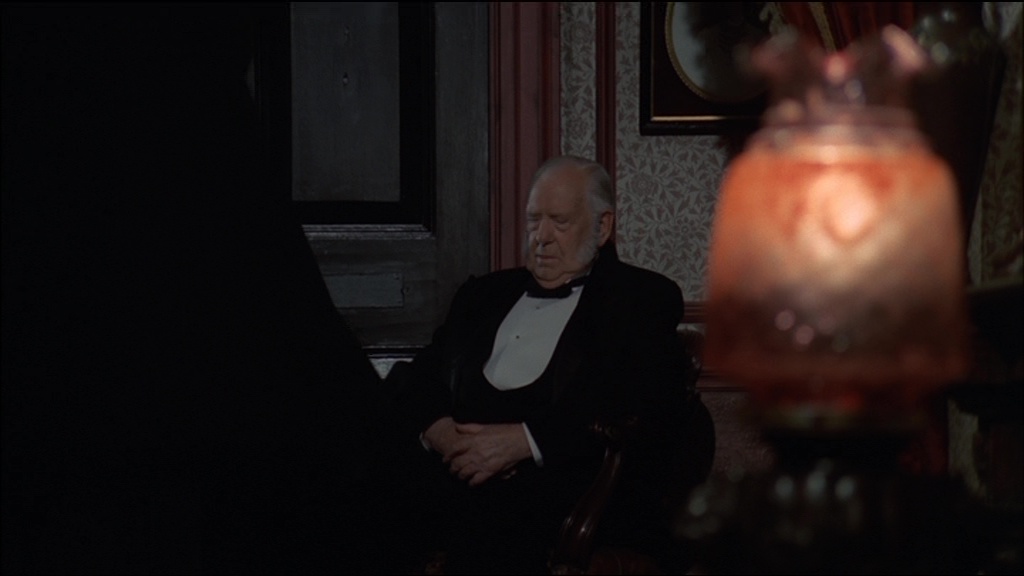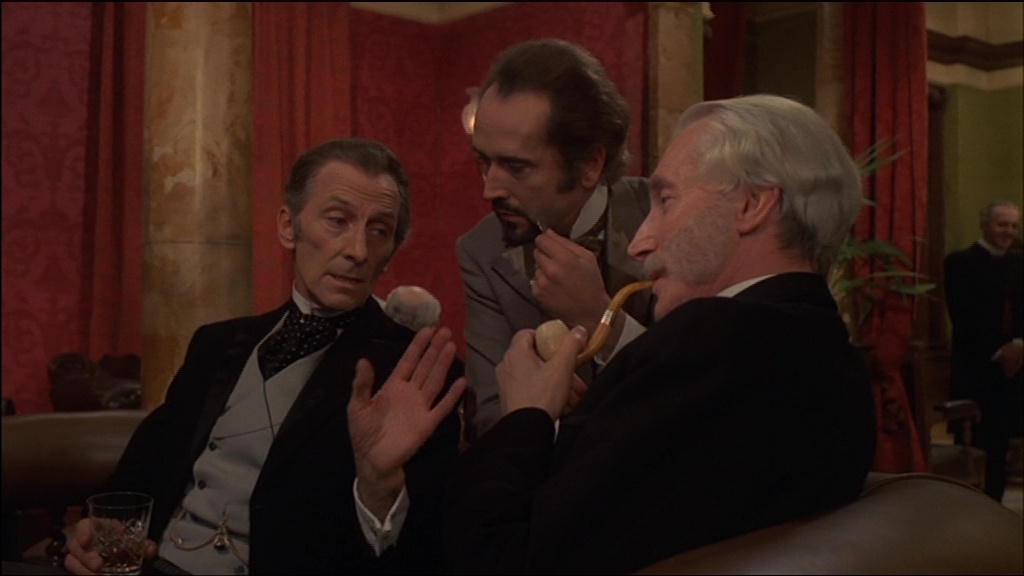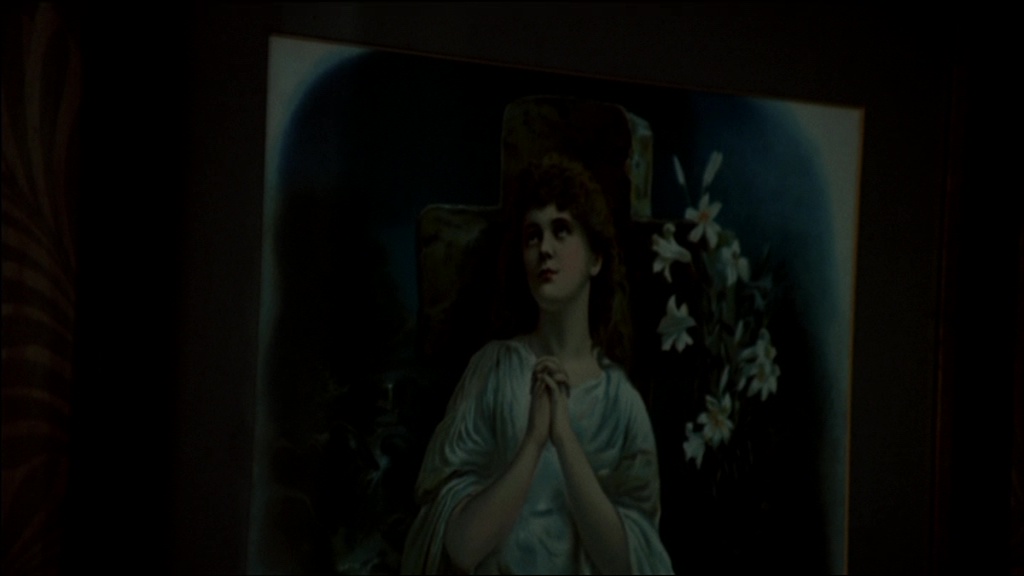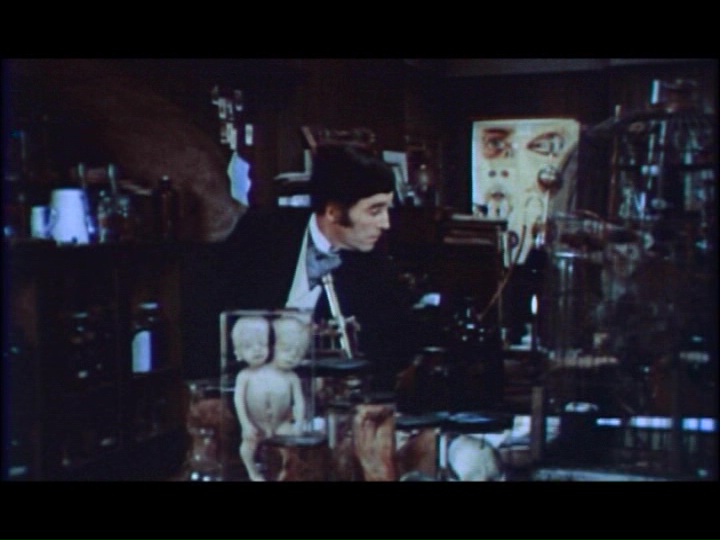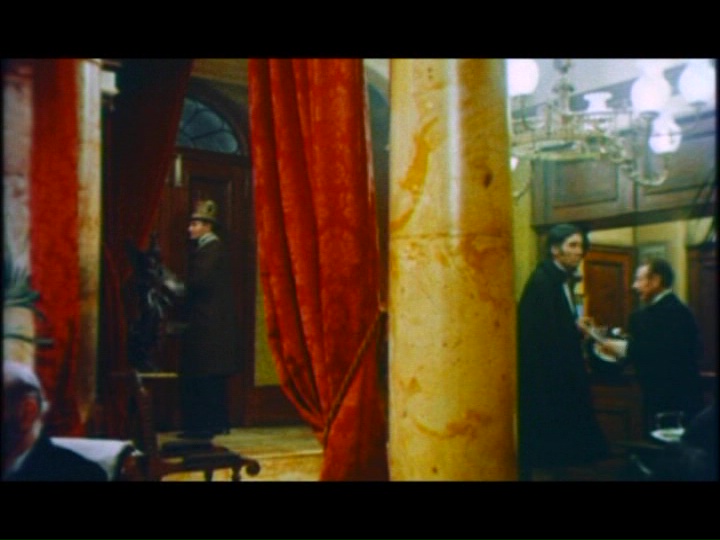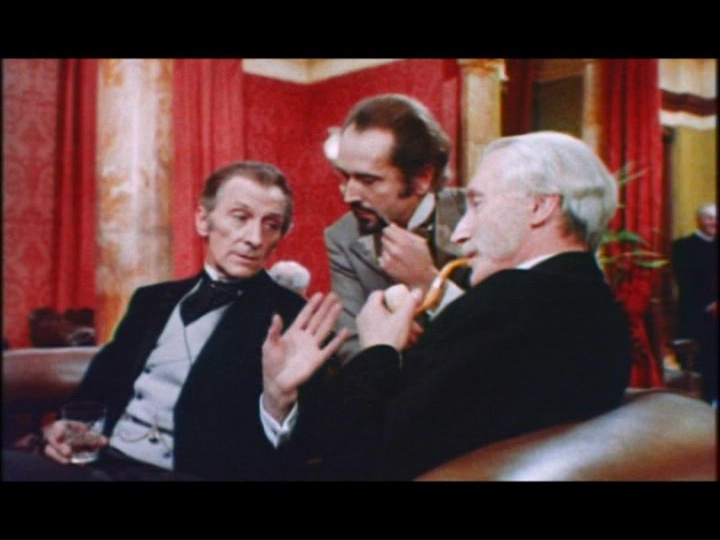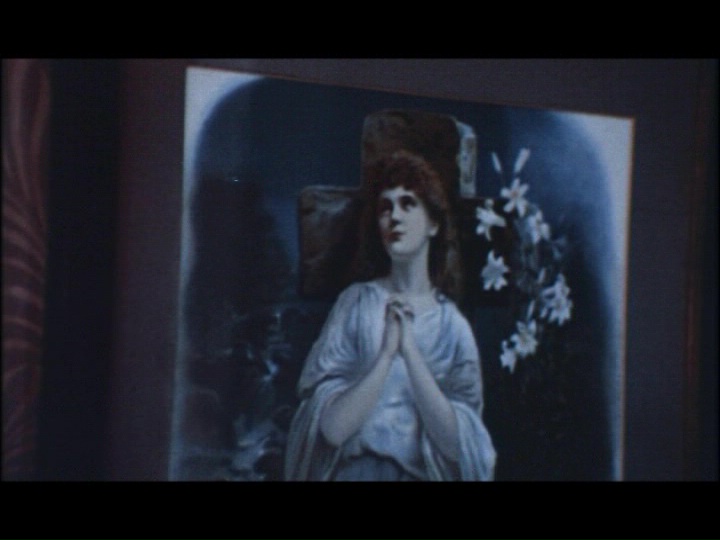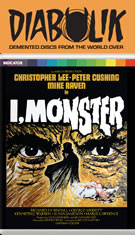
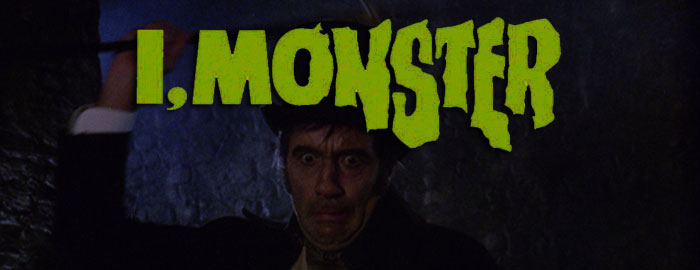
Color, 1971, 80 mins. 40 secs. / 75 mins. 21 secs.
Directed by Stephen Weeks
Starring Christopher Lee, Peter Cushing, Mike Raven, Richard Hurndall, George Merritt
Indicator (Blu-ray) (UK RB HD), Optimum (DVD) (UK R2 PAL) / WS (1.85:1) (16:9), Retromedia (DVD) (US R1 NTSC) / WS (1.85:1)
Though 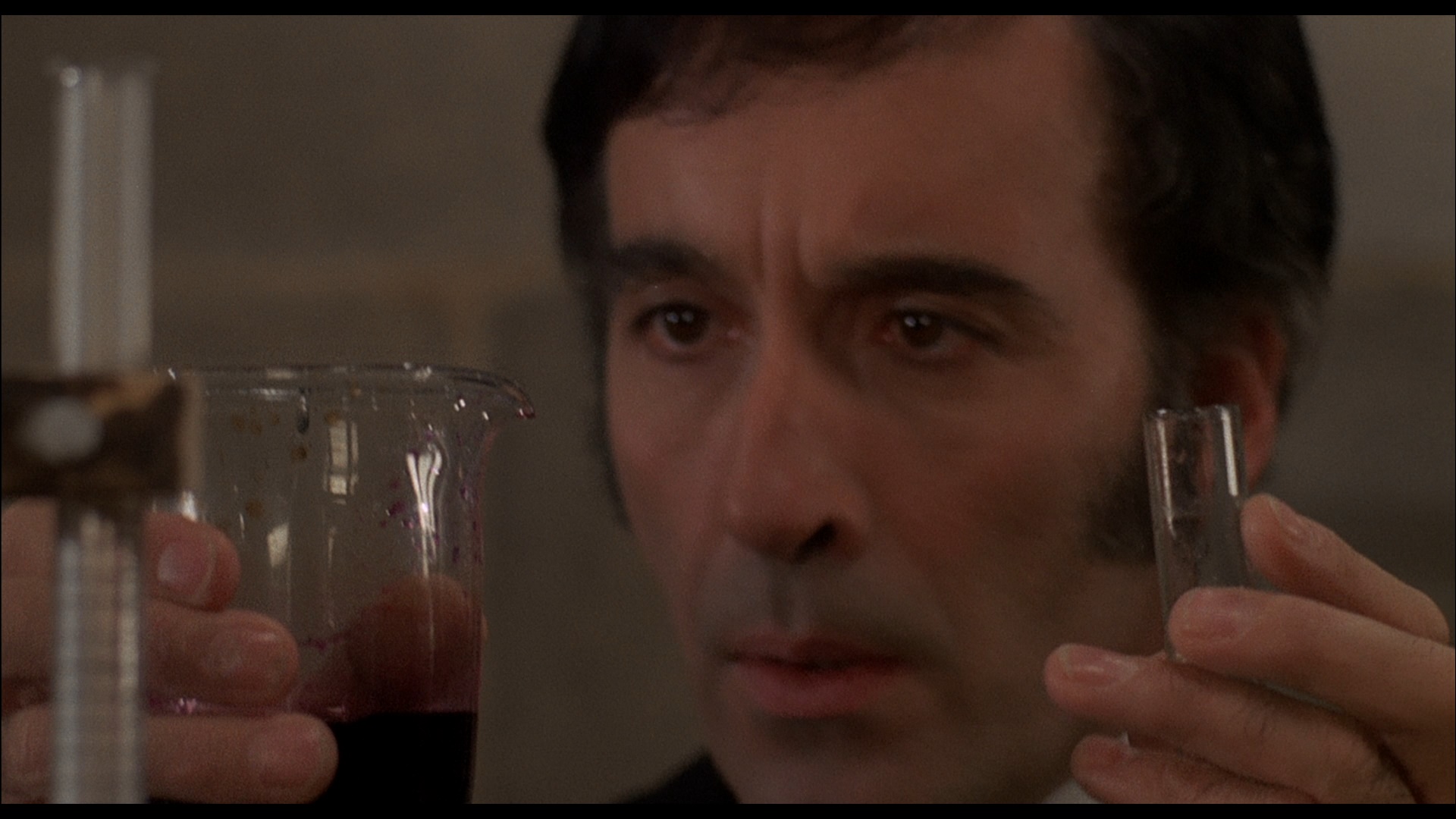 he had appeared as a very debauched
he had appeared as a very debauched 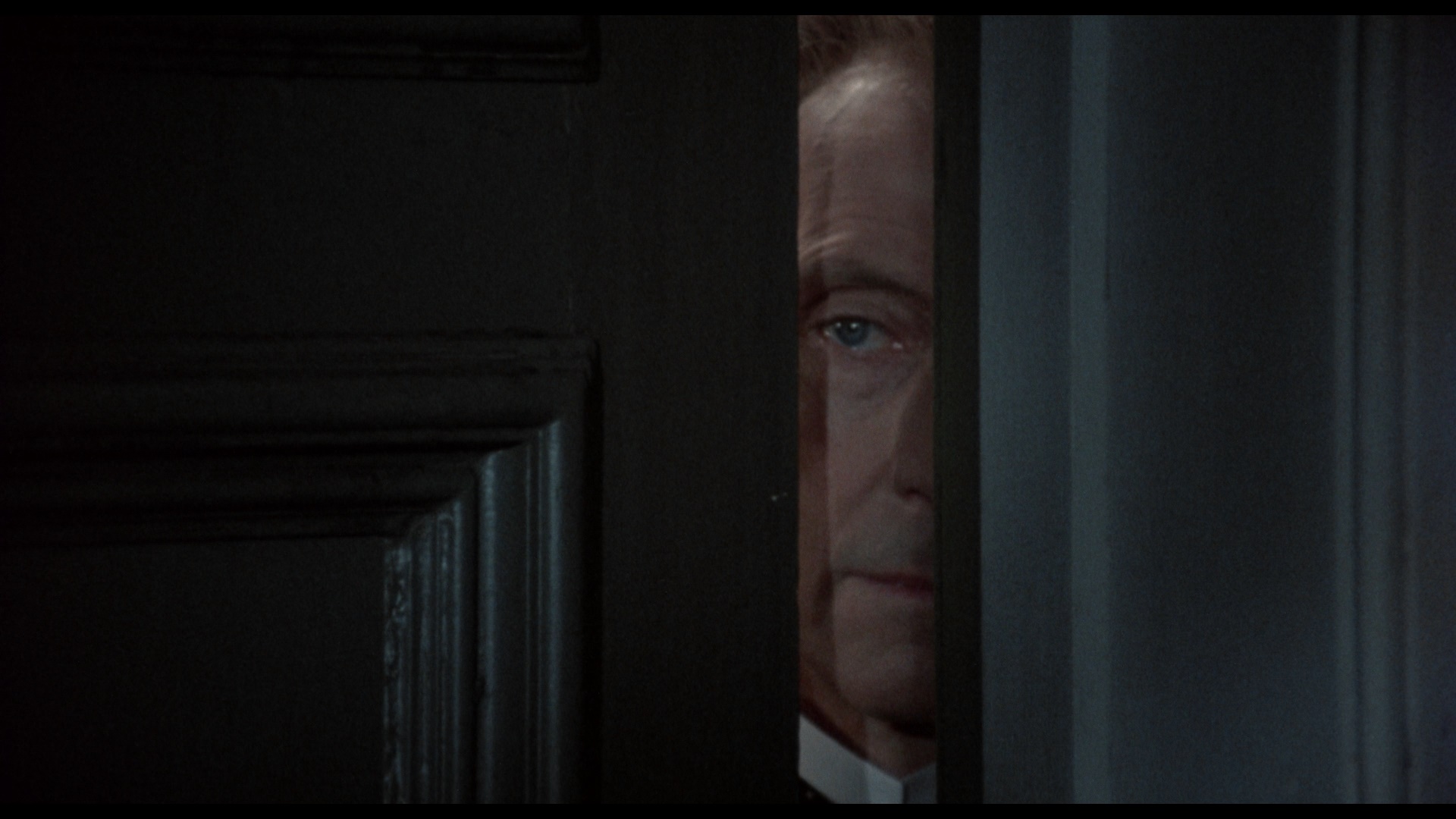 supporting character in the 1960 Hammer film The Two Faces of Dr. Jekyll, Christopher Lee didn't get a crack at playing the doctor himself and his murderous alter ego (albeit with the names changed) until a decade later with this variation from Amicus. Known for its highly effective horror anthologies, Amicus was still trying to break through with single-narrative genre films after past efforts like The Skull, The Psychopath, and The Deadly Bees, so they made the logical choice to reunite the busy team of Lee and Peter Cushing here for the directorial debut of director Stephen Weeks, who had turned out some acclaimed short films and would go on to the helm the unusual Ghost Story three years later.
supporting character in the 1960 Hammer film The Two Faces of Dr. Jekyll, Christopher Lee didn't get a crack at playing the doctor himself and his murderous alter ego (albeit with the names changed) until a decade later with this variation from Amicus. Known for its highly effective horror anthologies, Amicus was still trying to break through with single-narrative genre films after past efforts like The Skull, The Psychopath, and The Deadly Bees, so they made the logical choice to reunite the busy team of Lee and Peter Cushing here for the directorial debut of director Stephen Weeks, who had turned out some acclaimed short films and would go on to the helm the unusual Ghost Story three years later.
Thanks to his unorthodox experiments involving monkeys and fetuses, Dr. Charles Marlowe (Lee) has distilled a new chemical essence that can unlock the inhibitions of the human mind and provide a potentially valuable form of psychological therapy. A regular at his nearby gentlemen's club, he tries to suss out the impact of his findings with fellow members like the philosophy-spouting Frederick Utterson (Cushing) and Enfield (Lust for a Vampire's Raven). Unfortunately the process involving a kitty and an uniwtting young woman has a nasty side effect, with when the good doctor tries shooting up with his own serum, he turns into a murderous nocturnal prowler known as Edward Blake who likes to bludgeon people with his cane on the streets of Edwardian London.
A curious 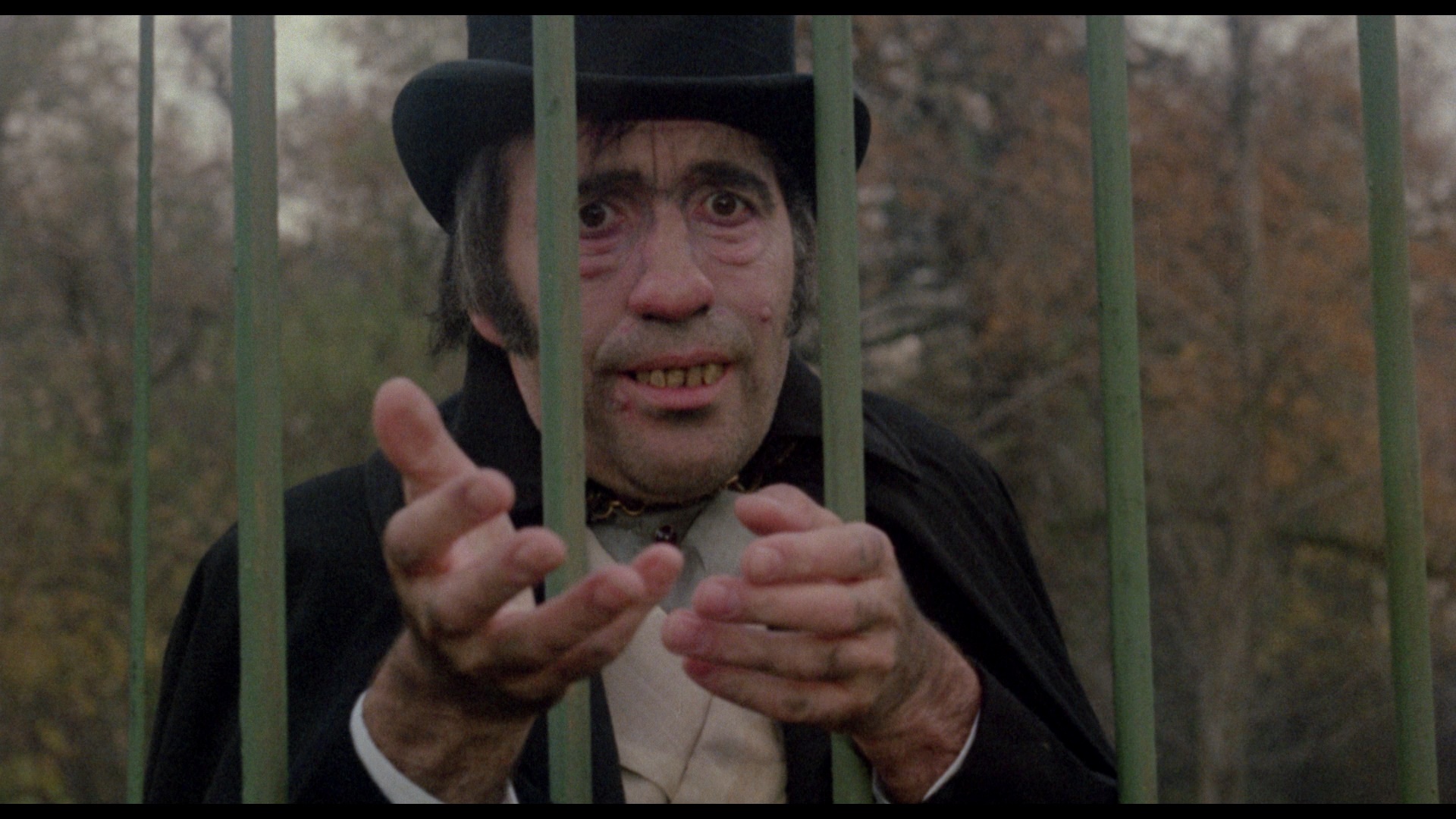 adaptation in many respects, this one completely jettisons the two major female characters (a "good" fiancée and a "bad"
adaptation in many respects, this one completely jettisons the two major female characters (a "good" fiancée and a "bad" 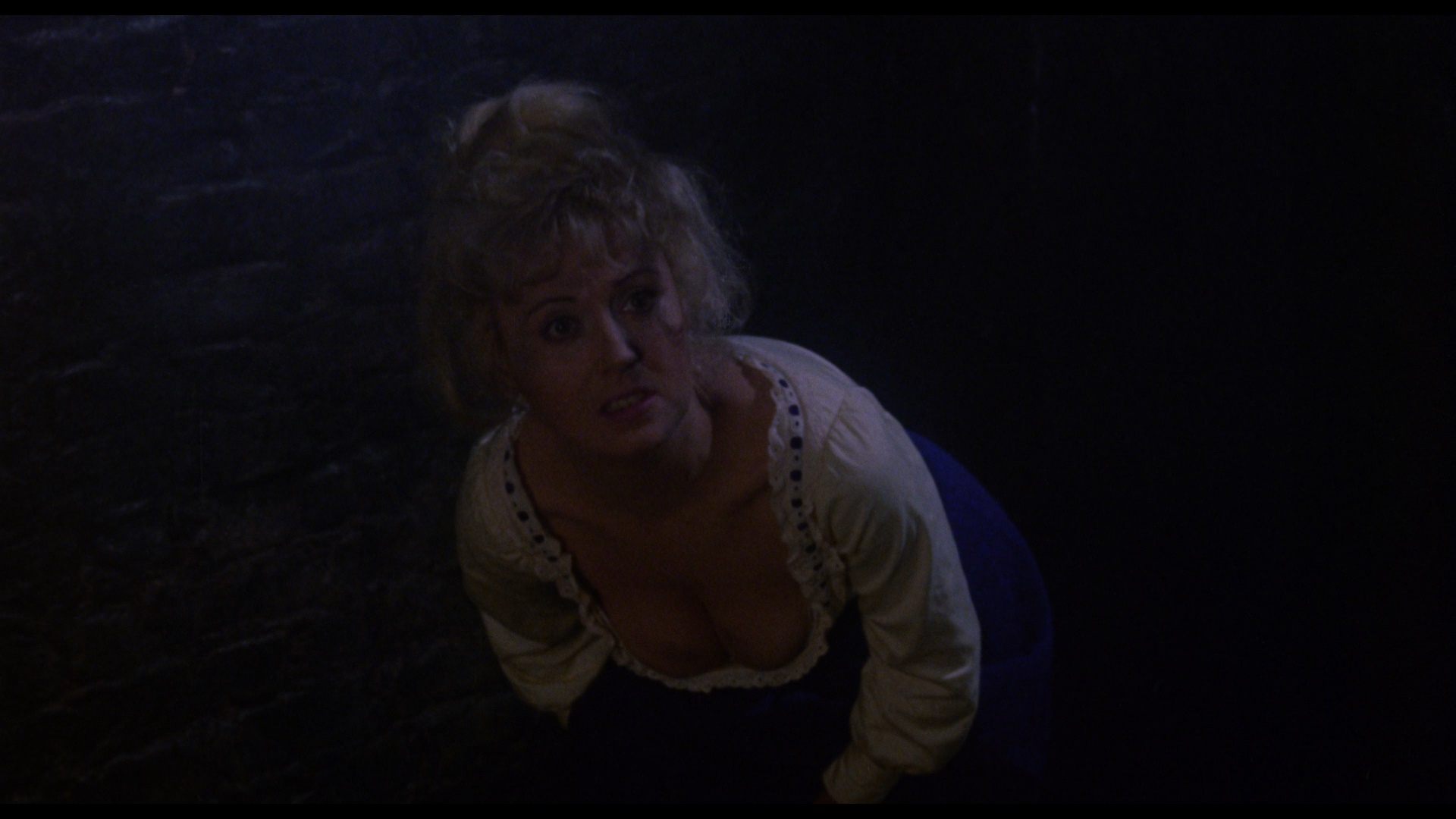 streetwalker) known from most film versions; instead the film goes back to the original Robert Louis Stevenson source material (name changes notwithstanding) including the prominent focus on the Utterson and Enfield characters. Not spoken of terribly fondly by many of its key participants, the film has actually aged nicely with its peculiar atmosphere and a strong central performance by Lee making it easier to appreciate now when it isn't being crowded out at cinemas by a hundred other competing horror titles. Released in the U.S. by The Cannon Group (in its original British incarnation), this was actually quite a difficult film to see for many years (the late '70s through the entire 1980s) with tantalizing promotional stills in a large number of genre books leaving many fans frustrated that it would ever turn up again.
streetwalker) known from most film versions; instead the film goes back to the original Robert Louis Stevenson source material (name changes notwithstanding) including the prominent focus on the Utterson and Enfield characters. Not spoken of terribly fondly by many of its key participants, the film has actually aged nicely with its peculiar atmosphere and a strong central performance by Lee making it easier to appreciate now when it isn't being crowded out at cinemas by a hundred other competing horror titles. Released in the U.S. by The Cannon Group (in its original British incarnation), this was actually quite a difficult film to see for many years (the late '70s through the entire 1980s) with tantalizing promotional stills in a large number of genre books leaving many fans frustrated that it would ever turn up again.
Luckily this one did start to resurface with some belated VHS releases in Europe in the latter half of the '90s, and in 2005 it received its first DVD edition from Retromedia in the U.S. Unfortunately that flat letterboxed transfer left a lot to be desired thanks to very mushy detail, garish color timing, and severely blown-out white levels. Clocking in at 80m15s, that disc also contains the U.S. trailer and an image gallery. A better (albeit no frills) DVD option came later in the U.K. from Optimum in 2007, running 76m56s at PAL speed and looking quite a bit healthier (albeit a little too dark for comfort).
The best option in every respect is the 2020 Blu-ray from Indicator, which is cited as "2K restoration by Powerhouse Films from original film materials." Whatever that source may be, it looks like the same film element as the earlier Optimum disc but improved here with a brighter, cleaner image and more satisfying color timing that allows little splashes of crimson in the production design to pop. It isn't a particularly pretty film (the unsuccessful attempts to utilize the Pulfrich effect 3-D process probably didn't help) with a somewhat grainy and rough veneer, but this is by far the best it's looked on home video to date. Audio is provided in DTS-HD MA 1.0 English mono with optional English SDH subtitles.  The film is offered in two viewing options, the familiar 80-minute "extended" version seen on
The film is offered in two viewing options, the familiar 80-minute "extended" version seen on 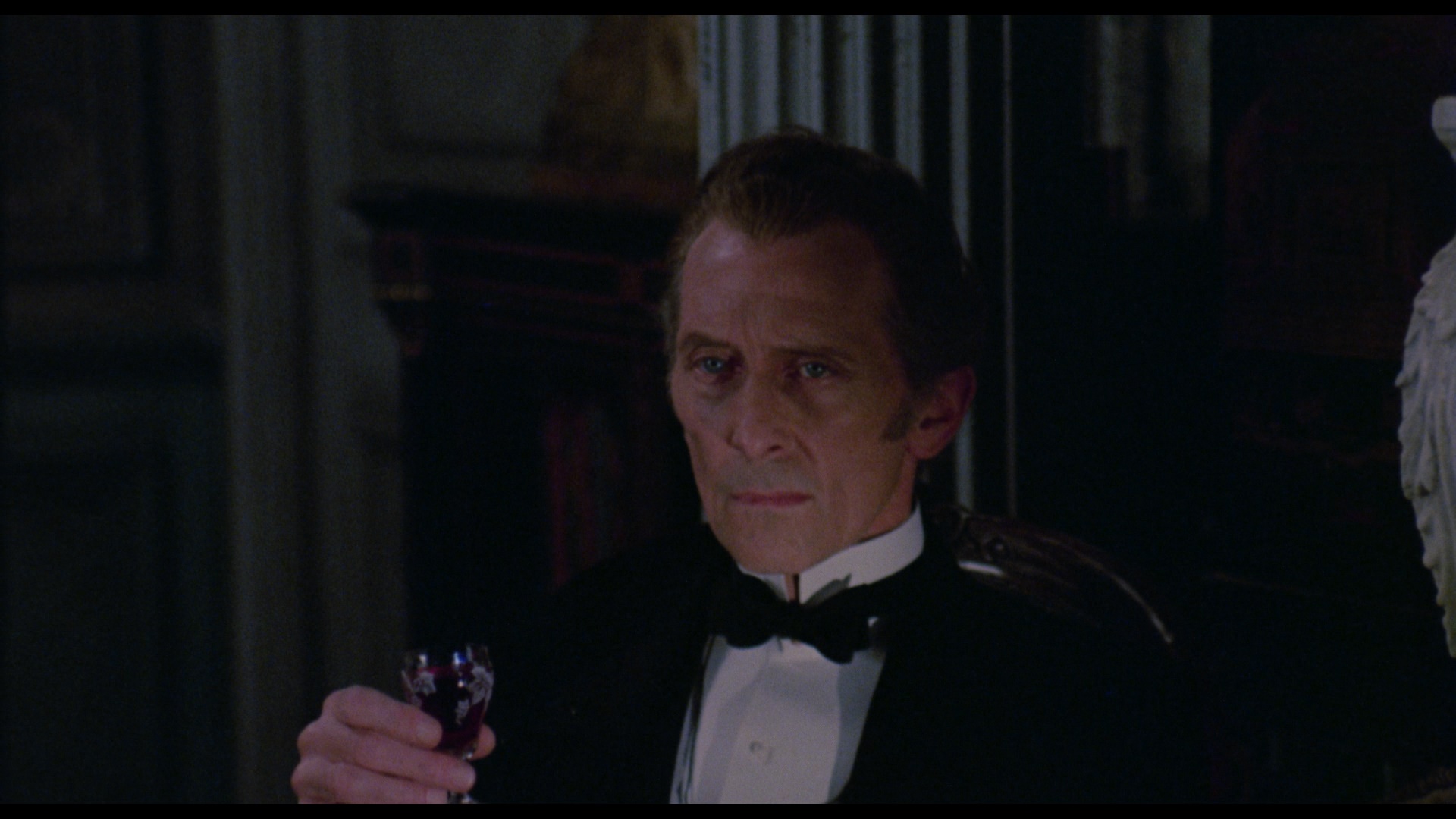 the previous DVDs as well as the tighter 75-minute cut first seen in cinemas. An audio commentary with Weeks is extremely thorough and interesting right from the outset (noting that the creepy two-headed baby specimen was actually real) with plentiful detail about the casting, Amicus, the production details, budget issues, the odd 3-D attempt dreamed up by Amicus co-founder Milton Subotsky (spoiler: it didn't work), the identity of the cat sound dubber, and lots more. A second commentary from 2005 featured Sam Unland chatting with Weeks about the film, which goes in more of a linear order covering the film from initial conception through execution with only some occasional overlap with the other commentary and touches on several interesting bits like the reason for the Jungian elements in the script. Another audio option is part one of editor Peter Tanner's interview for The British Entertainment History Project in 1987, conducted by filmmakers Roy Fowler and Taffy Haines covering his work from the silent era to 1939 with extensive coverage of his early life and his time in the British film industry during its infancy. In the new "I, Maestro" (18m8s), composer Carl Davis goes into his positive working relationship with the "eccentric" Weeks (who would reclaim and restore various houses and castles in his spare time), the drawbacks of the 3-D concept on the film's staging, and the "decadent" sensibility he brought to his score. A short video interview by horror author and Indicator staple Stephen Laws (5m57s) is a solid thumbnail sketch of the film's background and placement in the history of Amicus and the Stevenson story (as well as the correct Scottish pronunciation of "Jekyll"), followed by an interesting VHS-shot interview with Weeks (15m47s) by Laws in 1998 at Manchester's 9th Festival of Fantastic Films for a screening of Ghost Story. The Amicus side is represented by a very lengthy archival audio interview with Subotsky (181m50s) over several sessions with writer Philip Nutman in 1985, covering the entire history of the company with copious archival photos illustrating it along the way. Pure catnip for Amicus fans, with chapter stops helpfully provided for each major film so you can easily bounce around to find a discussion of your personal favorites. Also included are the U.K. and U.S. trailers (both in good shape and in HD), plus an option to watch the U.S. trailer with commentary by Kim Newman and David Flint. The disc closes out with two extensive galleries for promotional material (131 images) and behind the scenes photos (56 images), while the 3,000-unit limited edition also comes with a 36-page booklet featuring new liner notes by Josephine Botting, a written account by Subotsku, an archival Weeks interview, and sample critical responses.
the previous DVDs as well as the tighter 75-minute cut first seen in cinemas. An audio commentary with Weeks is extremely thorough and interesting right from the outset (noting that the creepy two-headed baby specimen was actually real) with plentiful detail about the casting, Amicus, the production details, budget issues, the odd 3-D attempt dreamed up by Amicus co-founder Milton Subotsky (spoiler: it didn't work), the identity of the cat sound dubber, and lots more. A second commentary from 2005 featured Sam Unland chatting with Weeks about the film, which goes in more of a linear order covering the film from initial conception through execution with only some occasional overlap with the other commentary and touches on several interesting bits like the reason for the Jungian elements in the script. Another audio option is part one of editor Peter Tanner's interview for The British Entertainment History Project in 1987, conducted by filmmakers Roy Fowler and Taffy Haines covering his work from the silent era to 1939 with extensive coverage of his early life and his time in the British film industry during its infancy. In the new "I, Maestro" (18m8s), composer Carl Davis goes into his positive working relationship with the "eccentric" Weeks (who would reclaim and restore various houses and castles in his spare time), the drawbacks of the 3-D concept on the film's staging, and the "decadent" sensibility he brought to his score. A short video interview by horror author and Indicator staple Stephen Laws (5m57s) is a solid thumbnail sketch of the film's background and placement in the history of Amicus and the Stevenson story (as well as the correct Scottish pronunciation of "Jekyll"), followed by an interesting VHS-shot interview with Weeks (15m47s) by Laws in 1998 at Manchester's 9th Festival of Fantastic Films for a screening of Ghost Story. The Amicus side is represented by a very lengthy archival audio interview with Subotsky (181m50s) over several sessions with writer Philip Nutman in 1985, covering the entire history of the company with copious archival photos illustrating it along the way. Pure catnip for Amicus fans, with chapter stops helpfully provided for each major film so you can easily bounce around to find a discussion of your personal favorites. Also included are the U.K. and U.S. trailers (both in good shape and in HD), plus an option to watch the U.S. trailer with commentary by Kim Newman and David Flint. The disc closes out with two extensive galleries for promotional material (131 images) and behind the scenes photos (56 images), while the 3,000-unit limited edition also comes with a 36-page booklet featuring new liner notes by Josephine Botting, a written account by Subotsku, an archival Weeks interview, and sample critical responses.
Reviewed on September 17, 2020
![]()
